- Home
- Carol Bruneau
A Circle on the Surface
A Circle on the Surface Read online
Advance Praise for A Circle on the Surface
“Reminiscent of Kate Chopin’s The Awakening in both style and approach, Carol Bruneau’s A Circle On the Surface captures the complexities, right up through to its tragic, memorable ending, of a woman’s role in 1940s Nova Scotia.”
–Donna Morrissey, award-winning author of The Fortunate Brother
“A compelling, unforgettable story of how World War II came to Nova Scotia, A Circle on the Surface reveals the sea changes for Enman and Una, a couple about to start a family. Delving into the depths of their lives, Bruneau gives us a powerfully haunting novel.”
–Anne Simpson, Griffin Poetry Prize-winning author of Is
“Carol Bruneau’s latest novel holds your heart right to the last, devastating sentence. In the tender lives of Enman and Una, naïve love and profound loneliness are infused with universal questions: peril and mortality, how and why we love, and the unknowable mystery of a human soul. A compassionate and beautiful read.”
–Carole Giangrande, author of All That Is Solid Melts Into Air
“A Circle on the Surface is a vivid, sensitive, often aching, imagining of a small Nova Scotia community looking fearfully out to sea during the Second World War. The sense of period and place is impressive but the characters and situations are timeless. Bruneau mines each minute, observing in exquisite detail. The book is an unsparing but nonjudgmental portrait of a community and of a marriage facing threats from without and within. Bruneau creates memorable characters, presented in all their complexity and contradictions in a clear-eyed way, and then she goes that important extra step of truly inhabiting them.”
–Mark Blagrave, author of Commonwealth Award–shortlisted novel Silver Salts
“Carol Bruneau’s novel A Circle on the Surface brilliantly explores the complexities of family dynamics with well-crafted characters and a most engaging story. She deftly portrays the lives of Maritimers affected by World War II and after as they emerge from a time of darkness into an ever-changing modern world. Once again, Carol Bruneau proves herself to be one of Atlantic Canada’s finest novelists.”
–Lesley Choyce, award-winning novelist and poet, and author of The Unlikely Redemption of John Alexander MacNeil
“A Circle on the Surface is an amazingly good read that will only go towards elevating [Bruneau] in the eyes of her longtime fans and the Canadian literary world at large.”
–The Miramichi Reader
Copyright © 2018, Carol Bruneau
All rights reserved. No part of this book may be reproduced, stored in a retrieval system or transmitted in any form or by any means without the prior written permission from the publisher, or, in the case of photocopying or other reprographic copying, permission from Access Copyright, 1 Yonge Street, Suite 1900, Toronto, Ontario M5E 1E5.
Vagrant Press is an imprint of
Nimbus Publishing Limited
3660 Strawberry Hill Street, Halifax, NS, B3K 5A9
(902) 455-4286 nimbus.ca
Printed and bound in Canada
NB1349
Cover image: Open Harbour, 24"x48", oil on canvas, 2017, Lynn Misner
Design: Jenn Embree
This story is a work of fiction. Names, characters, incidents, and places, including organizations and institutions, either are the product of the author’s imagination or are used fictitiously.
Library and Archives Canada Cataloguing in Publication
Bruneau, Carol, 1956-, author
A circle on the surface / Carol Bruneau.
Issued in print and electronic formats.
ISBN 978-1-77108-592-2 (softcover).
—ISBN 978-1-77108-629-5 (HTML)
I. Title.
PS8553.R854C57 2018C813’.54C2018-902853-X
C2018-902854-8
Nimbus Publishing acknowledges the financial support for its publishing activities from the Government of Canada, the Canada Council for the Arts, and from the Province of Nova Scotia. We are pleased to work in partnership with the Province of Nova Scotia to develop and promote our creative industries for the benefit of all Nova Scotians.
For my beautiful men: Bruce and our sons.
He has marked out a circle on the surface of the deep as the boundary of light and darkness.
—Job 26:10
1
Some day she will leave him too, as others have left him. In the blink of an eye, before he even realizes his daughter is ready to leave the nest, she’ll be gone—as sure as buds become leaves and sounds become notes. Life has this much logic, thinks Enman Greene. He shifts in his scuffed wooden seat, one of a few mismatched chairs in the otherwise empty space. You would expect, given its fancy new digs, the conservatory would be better furnished, he thinks. Piano scales spill through the waiting room’s walls, the bleats of a trumpet, some honking clarinet. Couldn’t they make this grand, echoey house a bit more comfortable for pupils and parents? At least the light is good, spring sunshine pours in through lofty leaded windows.
More random notes rise and fall, a broken chord. It’s Penny’s playing he’s listening to. He hopes his dear girl’s maturing will follow the pattern of a nicely timed melody, though he knows it will have its share of discord, like everybody’s. It’s how life goes, he thinks, adjusting his cane. Tapping it like a walking stick, as if it’s an accessory not an aide. Though some people like to believe life goes according to plan, it’s foolish to think it will, and foolish to baby your loved ones. There will be something seriously out of whack if Penny doesn’t leave. If she finds a man, Enman thinks, may the marriage fare better than his. Though it’s jarring to think of Pen married. She’s not even a teenager yet. Imagine that baby face becoming a woman’s. He can’t, not really.
Yet it is happening, Pen’s growing up. His recognizing it is no epiphany. The odd thing is that until today, her twelfth birthday, he barely entertained the notion. The notion itself is a slap upside the head, as his neighbours in Barrein used to say. They also said, Enman, you crazy-arsed fool, what paradise have you been living in? If everything then had been paradise, he thinks, I would hate to see hell.
The sudden blast of a trumpet shakes dust from the chandelier. How are these students supposed to hear their mistakes over the din?
From behind her little window the receptionist points to the clock. Other parents don’t wait like this. Twenty minutes left. Does he seem on edge? He should have tucked the money for Penny’s lesson into her hand, waited in the car as he did before the conservatory’s move from more temporary quarters downtown. But he wanted to see its new surroundings, this turreted, supposedly refurbished pile as grand, once, as the house his wife, his dead wife, grew up in, not that he had ever been inside it. With the Second World War eleven years in the past, the conservatory, like the rest of Halifax, wants to be on the up and up. It’s scrambling to catch up with the rest of the world. God forbid another war will come and set the province back a further fifty years.
But here’s progress: when he was Pen’s age he’d have killed to take lessons in the city. The most his mother had managed for him was some accordion lessons in the room behind the village store. The accordion itself had wound up in a snowbank, heaved there by his father. The conservatory is the last place Enman imagined being, let alone as a parent waiting for his child. It seems only yesterday Pen was toddling around, peanut butter fingers grabbing his fiddle when he finally worked up the nerve to haul it out. Pen had that knack for getting into things he thought were out of her reach. It was especially acute before the sad, saddest, part of their past got put behind them.
Now, squealing violin joins the racke
t. The noise dips, swells, dips, swells. Like ocean waves, money markets, a panic attack. At least he’s not the panicky type, Enman thinks—luckily, given the scrapes he’s found himself in. One thing he is certain of: he’s never made an instrument shriek like this. A symphony of the harbour’s horns, groaners, and bell buoys would sound more musical. Yet the receptionist doesn’t flinch. Stifling a laugh, Enman clenches. A stiffness moves from his jaw to his shins, to his war wounds, nerve damage. He reaches for his handkerchief, then inside his sportsjacket for the thin little envelope. Finding it safe there, he adjusts his tie, though it’s Saturday. It’s not every day your daughter turns twelve. Today is the day he has chosen to tell Pen about her mother.
“Steady on, man, think harmony,” his old bachelor buddy Hubley used to say. Once he got over some of the guilt he lugged around, Enman had lived for music—other people’s music, not his own—as well as for Penny. The same friend would strum a beat-up Les Paul guitar, hoping to entice Enman into accompanying him on violin. They even performed together a couple of times back in Barrein before Una, his wife, disappeared. But he quit playing even before moving to town. There’s no one here to play with anyway, and practicing is problematic with neighbours so close, living cheek by jowl. In Barrein there was space.
Penny’s rendition of the G major scale drifts in as if breaking through fog. Through the door behind which she disappeared, someone coaxes, “Pretend you’re holding an orange. You think Hanon was invented for someone else, Penelope?” The Hanon exercises, devised in 1873, says the dung-coloured book untouched atop Pen’s rented Willis. This is 1956, Enman wants to shout, can’t you people jazz things up a little? Next, he hears Pen stump through an arpeggio, childish fingers forced into a fruit-hold.
“Penelope, dear, this helps the attack.”
Since when was playing a military maneuver? No wonder Pen hates practicing. Don’t most kids? Yet he insists to her that music is a joy to carry you through sorrow. And playing it keeps idle hands busy, a distraction and a safeguard against less wholesome activities. She’s only been taking lessons for nine months. “Music soothes the savage beast,” Hubley used to say. Enman never bothered correcting him. “‘Breast’, you mean.” Though playing violin hasn’t always been the balm or the distraction Enman needed, he sometimes wonders whether, if Una had had more of an ear for it, music might have eased what ailed her. As for Penny, he doubts that nagging is worthwhile. But how do you teach a child that few gains are made without some degree of pain? “If life was all cherries, you’d wind up with wicked gas,” his mother used to say.
Then, abruptly, Pen’s playing stops. “Jesus turns our sorrow into dancing,” his ma also said, quoting her priest, then chuckling, “Not quite.” Seconds later, Penny bursts through the doorway, clutching her books. Her body is like a foal’s, he thinks, all elbows and knees, shins bluish below the pedal pushers she had to wear though there are still patches of snow on the ground. Her scowl reluctantly shifts to a grin. He pats her shoulder. “Give it a few more weeks. Don’t give up. Your birthday gift might help change your tune.”
“I’m starving.” Her eyes flash an adolescent’s impatience. “Are we going to lunch, like you said?” Her plastic barettes refuse to stay put; her straight, fair hair frames cheeks of baby fat. Just yesterday he found her rubbing red stuff on them, lipstick, probably, that Hannah got somewhere cheap. Hannah, who keeps house for them, no doubt encouraged her. It’s what Hannah does, however she can, being the closest Pen comes to having a sister. Not that either he or Pen can afford to be choosey, he realizes. It’s hard for Penny, not having a mother. If they had stayed in Barrein somebody might have filled in, the woman next door or the one down the hill, either would have helped. He tries his best to look after her. Though not long ago, when prompted by Hannah, Pen asked, “How come you never got married?”
“But I did. You know that.”
“Again, I mean.” She paused. “Why not to Win Goodrow?”
“Your mother was much better looking.”
On the way to the car Penny flutters and flaps her books in the air. They’re filled with composers he has never heard of. Their covers are as stiff and glossy as when he purchased them at Phinney’s, the music notation book with its leaves of blank staves barely opened.
In the pure April sunshine Pen’s eyes have the liquid sheen Una’s did, their irises the same cool transparency. Her hair, nothing at all like her mom’s, has his ma’s ever-so-faint reddish tinge, so he often tells himself.
“Still up for Camille’s? Fish ’n’ chips still the plan?”
Hannah will be beside herself with excitement, waiting at home with the cake and presents. Someone needed to be there for the deliverymen. If he’d scheduled things differently, if he hadn’t planned to speak privately to Pen, Hannah might have come along, except she hates fish.
“You could just get chips,” Penny advised, ever thoughtful.
“I still hates the smell.”
Acting grown-up, Pen acquiesced: “Suit yourself, Han.”
At the other end of the city, Camille’s is practically underneath the brand new suspension bridge. You have to wonder at the towering girders, cables holding up not just the roadway but streams of cars and trolleybuses. During the war the harbour was so crammed with convoy traffic that ships would have struck its piers.
Pulling in to the curb, Enman tugs on Pen’s hair. “Cod or haddock—or go for the halibut?”
“For the helluvit.”
“All right, enough with the language.”
“Hannah says it.”
“Hannah says lots of things. She can get away with it.”
Pen smiles. She looks sheepish, almost indulgent.
Moving up the harbour, a solid bank of fog blots out the Dartmouth side, hides the far end of the bridge. It swirls in tumbleweeds along the asphalt. Penny takes a giant whiff. The air’s salty riff is easily Enman’s favourite smell in the world, reminding him sharply, as it does, of Barrein. The Gulf Stream mixing with the Labrador Current, they were taught in school.
The fish ’n’ chip shop is the same inside as when they started coming here, he and Penny, just after they moved to Halifax. Arborite, stools, a couple of tables with dispensers for ketchup, vinegar, salt. He may be a tad overdressed, but who cares? The smell hits them straight away, chip fat and the sweet tang of tartar sauce. Deep-fried everything; just the thought gives him heartburn. But it’s Penny’s favourite. Except for two fellows at the counter, they have the place to themselves.
“I bet Hannah wishes she came.”
He feels for the envelope inside his jacket, and something else, tucked inside the hankie, a tiny token of Una.
“It’s just as well she didn’t. There’s something I’d like to talk about, just you and me—”
“About my present?” Pen looks confused, her curiosity dulled by dismay. “It’s not a doll, is it?” Enman smiles, thinking of last year’s gift, the walking doll she’d requested, a doll the size of a large child. Pen’s look brightens. “I know! It’s a puppy! It is, isn’t it? Daaad, tell me. I can’t wait!”
Neither can he. The gift, the special one, should soon be in place. There’s already a record waiting for her, Elvis’s new 45, Heartbreak Hotel, with “I Was The One” on the flipside. Both songs are much too old for her, he thinks; she asked for the record at Hannah’s urging. Then he remembers the tiny present inside the car’s glove compartment, the one item Pen coveted, a new charm for the silver bracelet he surprised her with at Christmas. Every girl wants one of these, the clerk at Birks had said, the bracelet adorned with a teeny-tiny cat and a wishing well complete with a windlass. Penny was tinkled pink by the well. He hopes she will like the miniature roller skate he has chosen, which Hannah had wanted to wrap in waxed paper and hide inside the cake she baked. He could limp out to the car and get it, but the charm will keep.
Enman scrapes together all the th
ings he’s summoned up about Una, anticipating this day. A day that’s been coming since before Penny could talk. Now, as the waitress sidles over, he wonders if his girl is mature enough to hear them.
“Get whatever you want, Pen. A one-piece? Two-piece? Halibut?”
“Just don’t say my eyes are bigger than my belly.”
“Go on, go crazy.” Briefly, he wishes there was chowder on the menu. The first time he played his violin for Una was the first time she cooked for him, clam chowder. Orange-tinted margarine melted atop watery canned milk. Now fear steals his appetite. “Nothing for me, thanks—just water.” How to pull together what he remembers and spit it out, without making Una sound awful? He has avoided talking about it for this long. “Fill your hollow leg, little girl—what doesn’t get eaten can come home with us. It’s your day.”
He takes a deep sip of water, a deeper, buoying breath. Pen deserves to know. He’s sure about his half of the story, but can only guess at Una’s. Guessing is all you’re left with, speaking for the dead. Filling in as much as anyone can.
“Sweetpea? Has Hannah told you—?”
“What? About my mother?”
This throws him off. People talk. He has been so careful to filter what she hears, to shield her from gossip. Perhaps after he’s told her the hardest part, how her mom died, he’ll feel lighter, relieved not just of this duty but of the guilt which led him to put away his violin for good. Maybe he will feel inspired to pick it up again, which he hasn’t tried to do since Pen was a toddler. Though its strings may well be dust by now. The way we’ll all be, someday, our bodies anyhow, he thinks. Who knows but souls don’t become like sounds that other species like dogs can hear but humans cannot, that exist beyond our hearing range? Spirits of the dead lounging in an airy realm where all sounds create harmony.
Just thinking it makes his water go down the wrong way. If Una was in such a place, he hoped it was peaceful.

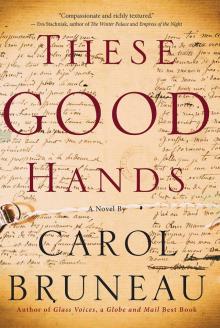 These Good Hands
These Good Hands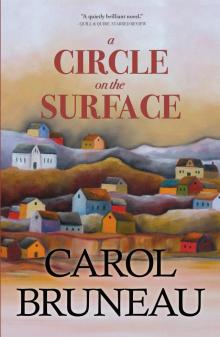 A Circle on the Surface
A Circle on the Surface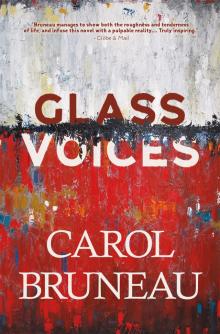 Glass Voices
Glass Voices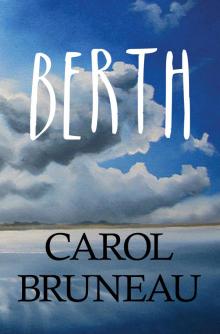 Berth
Berth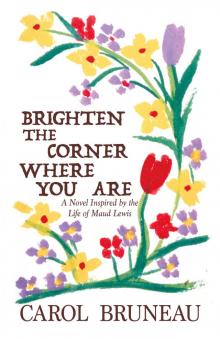 Brighten the Corner Where You Are
Brighten the Corner Where You Are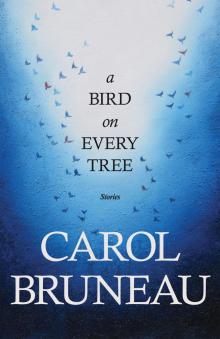 A bird on every tree
A bird on every tree